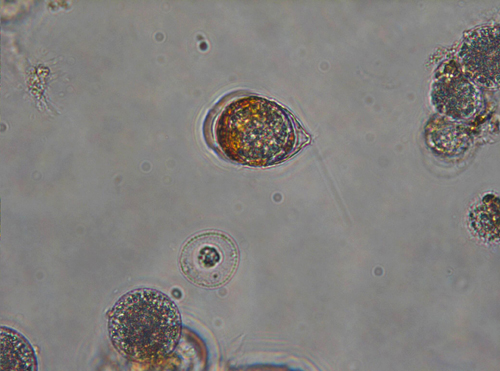A study, led by scientists from the Institut of Marine Sciencies (ICM) of the CSIC, shows for the first time how a parasite randomly attacks its microalgae hosts.
 Russian roulette is a game of deadly consequences subject to luck. The life of its participants depends on the chance that the trigger detonates the single bullet left in the cylinder. A study led by the Institute of Marine Sciencies of the CSIC (ICM-CSIC), reveals for the first time how a parasite of dinoflagellate algae randomly attacks its hosts, similarly to that macabre game. In this analogy, the likelihood that a bullet is fired corresponds to the algae susceptibility to the infection. The research has been published in the journal Frontiers in Microbiology.
Russian roulette is a game of deadly consequences subject to luck. The life of its participants depends on the chance that the trigger detonates the single bullet left in the cylinder. A study led by the Institute of Marine Sciencies of the CSIC (ICM-CSIC), reveals for the first time how a parasite of dinoflagellate algae randomly attacks its hosts, similarly to that macabre game. In this analogy, the likelihood that a bullet is fired corresponds to the algae susceptibility to the infection. The research has been published in the journal Frontiers in Microbiology.
Elisabet Alacid, the first author of the study, explains: “Survival of the parasite is randomly determined, like in the Russian roulette game. The parasite feels attracted by algae to which it will attack without knowing if the infection will be possible or not. If the host is susceptible, it would be as if the trigger has been pulled and no bullet is fired: therefore, the parasite wins, enters the host, reproduces and survives. But if the host is not susceptible, it is like when the bullet is triggered: the host is resistant and the parasite dies.
The infection strategy of parasites is a fundamental question for understanding their role in ecosystems, but it is still a poorly studied field. In the world of microorganisms, the degree of susceptibility against the attack by parasites depends on the species: there are very susceptible species, as well as less susceptible species and resistant species. At the same time, there are generalist parasites which have the ability to infect multiple host species and although they may have a preference for certain species, they may also infect other species which show little resistance.
In this paper, the scientists study the generalist parasite Parvilucifera sinerae and their potential hosts, microscopic algae of the dinoflagellate group. Researchers have found out that the parasite is equally attracted by all the hosts.
Esther Garcés, director of the study, suggests that this parasitic infection strategy might have different effects on the environment, depending on the abundance of hosts and their susceptibility. When susceptible hosts are dominant, the infection is easily transmitted and therefore the proportion of parasite increases, the latter playing a key role in structuring the community.
"For example, when the community is made up of two highly sensitive species competing for the same resource, the parasite can facilitate the coexistence of both. This happens if the infection reduces the population of the most competitive host, which can help the less abundant host to increase", explains the researcher. On the other hand, when a resistant host dominates the community, the parasite population decreases. "The latter will survive at low concentrations, until its preferred hosts become abundant again", says Garcés.
Resistant and susceptible strains
Algae susceptibility to parasite infection doesn’t only depend on the species the host belongs to. "Within the same species, differences in genetics may lead to strains more or less resistant to a given parasite, similar to what happens in bacteria developing resistance against antibiotics", says Elisdabet Alacid. "Equally –she continues–, different strains of the parasite may also show a greater or lesser virulence faced with the same host”.
This fact hinders the study of the relationship between both organisms, and also complicates the possible use of parasites to control episodes of toxic algal blooms. In some cases, the possibility to release generalist parasites to fight algae blooms has been considered but the fact that they are unspecific can have a negative impact on other species in the community and, consequently, on the ecosystem. According to Esther Garcés, "the use of a generalist parasite can be compared to a non-specific chemotherapy, which kills cancer cells but also many healthy cells. In addition, not all strains of the parasite are useful in controlling an algal bloom, neither do all strains of algae show the same susceptibility".
Reference article:
Game of Russian Roulette for a Generalist Dinoflagellate Parasitoid: Host Susceptibility Is the Key to Success. Elisabet Alacid, Myung G. Park, Marta Turon, Katherina Petrou and Esther Garcés. Frontiers in Microbiology. http://journal.frontiersin.org/article/10.3389/fmicb.2016.00769/full
